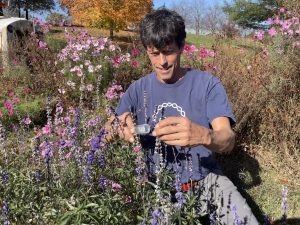 An excerpt from Jay Evans’ April Article on Social Nature and Hive Life:
An excerpt from Jay Evans’ April Article on Social Nature and Hive Life:
…this is not another economic essay on the value of honey bee pollination or colony products, although $20-25 billion added to the US economy in diverse, nutritious foods is not trivial. Nor is it another diatribe that bee-mediated pollination nourishes people throughout the world, nor that honey bees provide a cash crop for millions of families, with little startup costs, in communities that are stressed for both cash and nutritious foods. And this is not a tribute to all the hardworking beekeepers, with from one to 80,000 colonies, who battle a variety of stresses to stay in the game (though I am not above pandering to that crowd). It’s not even a worshipful look at how pollinators have shaped our world over 100+ million years, not simply by supporting billions of humans but in making every landscape just a bit more colorful and dynamic. This collaboration between bees and flowering plants, which started early and ended well for both, is wonderful. But, I am going tackle the larger economic and environmental benefits of honey bees and other pollinators in the future, this essay is more personal.
I would argue that we socially aware humans just need honey bees beyond their great services. To me, this need comes from two drivers. First, honey bees mirror our own inescapably social natures and teach valuable lessons therein. Second, if you try even half-heartedly to place yourself in the mindset of honey bees and other pollinators you can’t escape thinking about, and striving to improve, the plant resources and the overall environment they fly over and visit on their foraging flights.
To listen and read the full article, go to: https://www.beeculture.com/found-in-translation-36/






